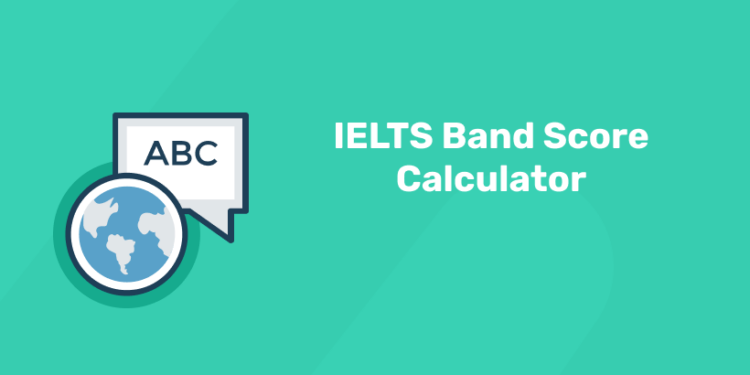Table of Contents
IELTS (International English Language Testing System) is a globally accepted English Language proficiency test. More than 4 million people take the test every year and it is accepted by 12,000 organizations in over 140 countries around the world. This makes IELTS the world’s most popular English language proficiency test for higher education and migration. The required IELTS band score depends upon the purpose of the test. Let us have a look in detail at the IELTS band score calculator.
Master the IELTS Exam with Online Coaching – Enroll Today!
What is the IELTS Band Score Calculator?
Overview
IELTS band score ranges from 1 to 9 on each of the 4 modules: Listening, Reading, Writing and Speaking.
The overall band score is the average of these 4 scores which will be rounded to the nearest whole or half band.
Scores ending in .25 are rounded up to the next half band and those ending in .75 are rounded up to the next whole band. For example, if the average of the four components is 8.25, the IELTS band score will be 8.5. If it is 8.75, the IELTS band score will be 9.
Purpose
IELTS is the globally accepted English language test that helps you secure acceptance into universities, student visas, to get into professional organizations in an English speaking country. This test measures your English proficiency and is often asked by universities and organizations. The score requirement varies based on countries and universities.
There are two IELTS tests to choose from: IELTS Academic and IELTS General Training. The former is to secure university acceptance, student visas, and prove your English ability to professional organizations whereas the latter measures your English proficiency in the workplace and is useful when applying for a new position.
Depending on the purpose, one has to apply for the Academic or General Training test. Knowing which test to attempt make it easier for you to prepare as there as slight difference in both the tests. One should also be aware of the score requirement of the university, organization or the country.
How is the IELTS Score Calculated?
1: Most university students ........................ on campus in their first year.
As mentioned earlier, IELTS overall score is calculated as the average of the band score of each section. Hence it is essential to comprehend the marking scheme and band score for each section.
Section-wise Breakdown:
Listening
This section consists of 40 questions with one point for each correct answer. The listening test is the same for both Academic and General Training. The band score is calculated on the basis of number of correct answers and are reported in whole and half bands.
Reading
The IELTS Reading test contains 40 questions of 1 mark each. Scores out of 40 are converted to the IELTS 9-band scale. The Academic Reading test may contain texts which feature more difficult vocabulary or greater complexity of style compared to General Training.
Writing
IELTS Writing section consists of 2 tasks – Task 1 and Task 2. They are assessed using four criteria. The criteria is the same for both GT and Academic tests. The only difference is in the writing Task 1. GT students have to write a letter in Task 1, whereas Academic students have to write a report.
Speaking
IELTS speaking test score is calculated on the basis of 4 criteria :
- Fluency and coherence (FC): This is to check how clear and structured is your speech is.
- Pronunciation (P) : To know how naturally you sound
- Lexical Resource (LR): To check your how good your vocabulary is.
- Grammatical Range and Accuracy (GRA): This is to assess the grammar skills.
Overall Band Score Calculation
IELTS overall band score is calculated by taking the average score of all skills. The tables below show how the overall score is calculated.
| Listening | Reading | Speaking | Writing | Overall |
| 8 | 8 | 7.5 | 7 | 8 |
The average of the above scores is 7.75 which will be rounded to 8.
| Listening | Reading | Speaking | Writing | Overall |
| 6 | 5 | 5.5 | 6.5 | 6 |
The average of the above scores is 5.5.
The overall test score is calculated by rounding off to the nearest .5 or whole band score. For example, if the overall score is 8.85, then it will converter to the nearest whole band, that is 9.
Ace Your IELTS Exam with Confidence!
Unlock your potential with our expert-led IELTS preparation course. Achieve your dream score and open doors to global opportunities!
Start Your IELTS Journey Today!IELTS Score Descriptors
Band Score Chart
The following charts show how the band score are calculated for each section. The band score depends on the number of correct answers for the listening and reading section, but the score varies across both the sections.
Listening
| Number of Correct Answers | Band Scores |
| 39 – 40 | 9 |
| 37 – 38 | 8.5 |
| 35 – 36 | 8 |
| 32 – 34 | 7.5 |
| 30 – 31 | 7 |
| 26 – 29 | 6.5 |
| 23 – 25 | 6 |
| 18 – 22 | 5.5 |
| 16 – 17 | 5 |
| 13 – 15 | 4.5 |
| 11 – 12 | 4 |
Reading
Academics
| Number of Correct Answers | Band Scores |
| 39 – 40 | 9 |
| 37 – 38 | 8.5 |
| 35 – 36 | 8 |
| 33 – 34 | 7.5 |
| 30 – 32 | 7 |
| 27 – 29 | 6.5 |
| 23 – 26 | 6 |
| 19 – 22 | 5.5 |
| 15 – 18 | 5 |
| 13 – 14 | 4.5 |
| 10 – 12 | 4 |
| 8 – 9 | 3.5 |
| 6 – 7 | 3 |
| 4 – 5 | 2.5 |
General Training
| Number of Correct Answers | Band Scores |
| 40 | 9 |
| 39 | 8.5 |
| 37 – 38 | 8 |
| 36 | 7.5 |
| 34 – 35 | 7 |
| 32 – 33 | 6.5 |
| 30 – 31 | 6 |
| 27 – 29 | 5.5 |
| 23 – 26 | 5 |
| 19 – 22 | 4.5 |
| 15 – 18 | 4 |
| 12 – 14 | 3.5 |
| 9 – 11 | 3 |
| 6 – 8 | 2.5 |
Speaking
There are four criteria in this section and the score range of each of these section is from 0 to 9. The score of the speaking section is the average of the scores of each criteria. If your marks in the speaking section are as follows:
Fluency and coherence (FC) – 5, Pronunciation (P) – 7, Lexical Resource (LR) – 7 and Grammatical Range and Accuracy (GRA) – 6, then the score of this section will be (5+7+7+6)/4 = 6.25. This will be rounded to 6.5.
The fluency and coherence (FC) criteria is to check how clear and structured your speech is. In order to score well in this, you have to speak smoothly and continuously using correct pauses and answer the questions by including all the relevant details.
Lexical Resource (LR) is to judge how good your vocabulary is. You can increase the score for LR by using a wide range of words appropriately and using idiomatic language.
Pronunciation is to check how naturally you sound. Learn the correct pronunciation of words, and also see that you use proper stress and intonation.
Grammatical Range and Accuracy(GRA) criteria is to test your grammar skills. Practice speaking and try to use more advanced grammatical structures.
Writing
The marking criteria for Writing section is as follows:
| Marking Criteria | Weightage |
| Task Achievement | 25% |
| Coherence and Cohesion | 25% |
| Vocabulary | 25% |
| Grammar | 25% |
Understanding Your Score
Each band score depicts the skill level of the test taker. Let us have a detailed look at each band score and the skill associated with it.
| Band score | Skill level |
| Band 9 | Expert – The person has full command of the language. The usage of the English language is proper, correct, and fluent, which demonstrates full understanding. |
| Band 8 | Very good – The person is capable of handling complex and detailed argumentation and has complete command of the language with occasional unsystematic inaccuracies. |
| Band 7 | Good – The test taker has a good operational command of the language. Although there maybe occasional errors, the person can handle complex language. |
| Band 6 | Competent – At this level, the person has a strong understanding of the language and can understand complex language, particularly in familiar situations. |
| Band 5 | Modest – The test taker can handle basic communication in their own field. He/she can cope with overall meaning in most situations, although they may make many mistakes. |
| Band 4 | Limited – Communication at this level is restricted to situations that the test-taker is familiar with. The person may have problem in understanding end expressing oneself. |
| Band 3 | Extremely limited – The test taker can only express and comprehend the generic meaning in familiar situations. . There may be frequent breakdowns while communicating. |
| Band 2 | Intermittent – The person has great difficulty in understanding spoken and written English. |
| Band 1 | Non-user – The person does not have the ability to use the language |
| Band 0 | The taker has not attempted the test |
Why Accurate Calculation Matters?
Impact on Goals
Goals lay the foundation for success. Setting a goal motivates you, pushes you to put that extra effort and encourages you to keep trying until you achieve it. This will help you to plan and utilize your time effectively.
The overall score of IELTS is the average score of all the four sections. Hence it is imperative to score well in all the sections to boost your final score. Now that you have understood the format and scoring pattern, it’s time to draw plans to achieve your target score. You will have to practice time management as well as work on improving your listening, speaking, reading and writing skills.
You need to identify your weak points. This will help you develop a strategy to improvise and thus maximize your chances of getting a better score.
University and Immigration Requirements
As you are aware, IELTS is one of the requirements for getting into educational universities and migrating to English speaking countries. However, the requirements are not the same for all the universities and countries. Score requirements will also vary depending on the visa requirements.
The IELTS General Training test is required for migration. The score requirement for various countries are as follows:
- Australia – 6
- New Zealand – 6.5
- UK – 4 to 7
- Canada – depends on your immigration requirements
If you are applying for a student Visa to enter directly into a university, you must meet the IELTS score set by the institution.
Master the IELTS Exam with Online Coaching – Enroll Today!
IELTS Additional Resources
Now that you have understood how the scores are marked, your preparation strategy can be tweaked to help you score the maximum. You have to identify your weak points and work accordingly. Moreover, understanding what the examiner looks for each section will also help you improve your scores.
Check out the following to prepare well for your upcoming IELTS test:
Ace Your IELTS Exam with Confidence!
Unlock your potential with our expert-led IELTS preparation course. Achieve your dream score and open doors to global opportunities!
Start Your IELTS Journey Today!Frequently Asked Questions
How is IELTS overall score calculated?
The overall band score is calculated by taking the mean of all four parts of the test.
How is IELTS reading score calculated?
IELTS Reading score is the number of correct answers out of 40 questions in the test.
How is IELTS score marked?
IELTS scores are marked from 0 to 9. The score are rounded to the nearest whole or half band.










